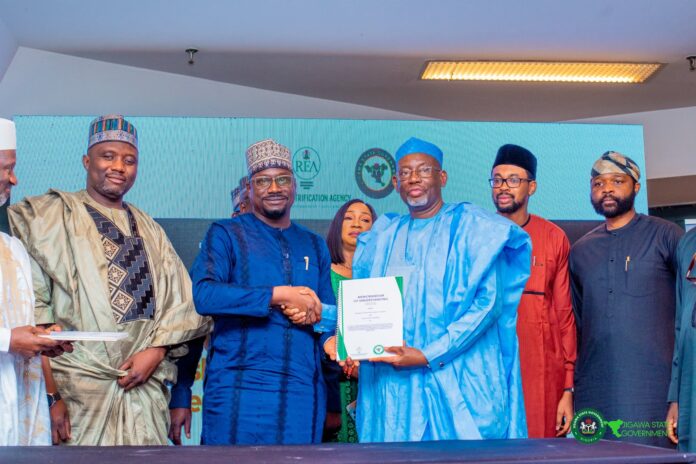By Hosea Parah, Abuja
The Rural Electrification Agency (REA) has hosted a significant roundtable in Abuja, Nigeria, with the Jigawa State Government to explore clean energy opportunities in the state. This event is part of the REA’s strategic state-by-state roundtable series designed to foster collaboration among state governments, Renewable Energy Service Companies (RESCOs), and other stakeholders in the energy sector.
Titled “Unleashing Market Opportunities for Decentralized Renewable Energy in Jigawa State”, the roundtable follows a series of discussions between REA and Governor Umar Namadi, who has been at the forefront of advancing clean energy initiatives in Jigawa. The engagement aligns with the objectives of the recently passed 2023 Electricity Act, which aims to rejuvenate the national electricity market and create a more conducive environment for private sector involvement.
Abba Abubakar Aliyu, Managing Director of REA, highlighted Jigawa’s potential to electrify up to one million people using solar mini-grids. These efforts are seen as pivotal for driving economic growth and investment in the state. As part of the Nigeria Electrification Programme (NEP), funded by the African Development Bank (AfDB), the REA is currently implementing 21 mini-grid projects across 21 local government areas (LGAs) in Jigawa, set to benefit over 300,000 people. Aliyu underscored the significance of these mini-grids, particularly in energizing communities that are critical for agricultural production, an essential sector for the state.
Governor Namadi expressed his commitment to promoting public-private partnerships (PPPs) that will fast-track renewable energy development in Jigawa. By signing a Memorandum of Understanding with the REA, the Governor reassured Renewable Energy Service Companies (RESCOs) that the state is ready to create a stable investment climate and secure ecosystem for clean energy projects. He emphasized that Jigawa, with its favorable geographic and climatic conditions, is well-suited for renewable energy investments.
The Governor also praised the policies introduced by President Bola Ahmed Tinubu following the passage of the 2023 Electricity Act. Namadi stated that Jigawa State is uniquely positioned to capitalize on the opportunities presented by these reforms, adding, “The potential for renewable energy projects in Jigawa is limitless.”
During the roundtable, Olufemi Akinyelure, Head of the Project Management Unit for NEP, discussed the World Bank-funded Distributed Access through Renewable Energy Scale-up (DARES) program. The program, aimed at providing mini-grids to energize 25 million Nigerians, emphasizes the need for greater private sector involvement to scale up renewable energy projects and optimize returns on investment.
Engr. Doris Udoh, Executive Director of the Rural Electrification Fund (REF), also highlighted REA’s E-HEART initiative, which targets energy solutions for healthcare, education, agriculture, rural development, and transportation. She noted that these efforts would contribute to boosting Jigawa’s internal revenues while driving economic development through renewable energy projects.
REA has a long history of implementing successful off-grid energy solutions in Jigawa, including solar home systems, mini-grids, solar streetlights, and electric vehicle charging stations. These projects continue to provide sustainable energy solutions to the state’s rural communities.
The REA’s state strategic roundtable initiative is designed to strengthen collaboration between the public and private sectors, accelerating the development of renewable energy solutions across Nigeria. With the 2023 Electricity Act laying the foundation for a more robust energy sector, REA is poised to continue fostering sustainable economic growth through clean energy projects that provide reliable, affordable, and sustainable power to underserved communities.

